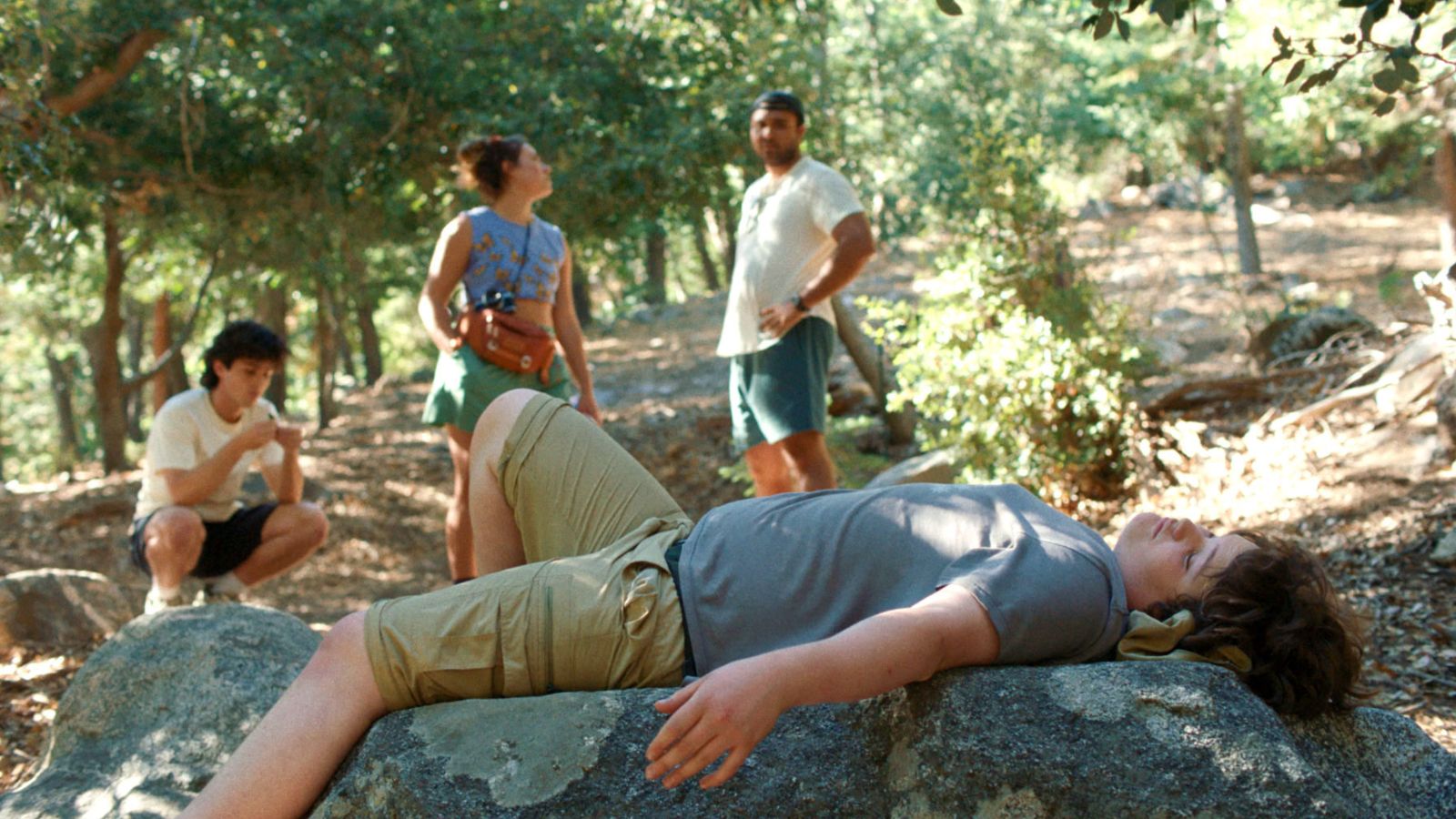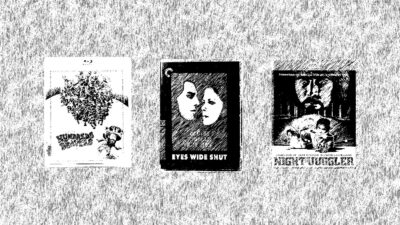Something that Will Wiesenfeld (Baths and Geotic) immediately makes clear about the writing of his first feature film score is that the prospect seemed very daunting. “I got really lucky,” he says of the opportunity to score director Corey Sherman’s debut feature-length film, BIG BOYS. “It was a mix of luck and having a balanced-enough career already where people identified that I could do it.” Sherman reached out to Wiesenfeld by email as an existing fan of his music, asking his interest, and all nerves were quelled once they began to hunker down and write together, where Wiesenfeld found Sherman a kindred collaborator.
The Los Angeles-based musician has nurtured a wondrous, variegated pool of explorative electronic music for over 15 years. His most recognized output is under the moniker Baths, known for beatific, fantasy-like glitch pop with poetic lyricism that often touches on concepts of queerness. Meanwhile, Geotic is a more pastoral affair, centering around fuzzy guitar experiments and sparse microhouse, but an equally authentic expression of Wiesenfeld’s mind. With his idiosyncratic style long established, the natural next step to expand his musical world would be to invite other creatives into it. Although he worked as the composer for the Netflix series BEE AND PUPPYCAT (show creator Natasha Allegri similarly reached out from being a fan), scoring a movie was an entirely new but incredibly rewarding endeavor. “When I’m writing music for myself, the fun of it is that I’m constantly playing a game with my own expectations,” Wiesenfeld explains, “but whenever you’re scoring something for another person’s project, it’s like a completely different part of my brain. It feels like I’m working in service to somebody else’s idea.”
—
Sherman’s BIG BOYS is a remarkably tender LGBTQ+ coming-of-age comedy with a refreshing, grounded, and body-positive take on a teenager exploring their sexuality. It follows the young Jamie embarking on a camping trip with his beloved cousin. Eventually, he finds out she’s bringing her new boyfriend, Dan, who bears a confident demeanor and larger frame. Jamie’s initial jealousy of Dan gradually turns into facing the turmoil of an unexpected, unreachable crush. The heartwarming and at-times hilarious film is brilliantly nuanced: there’s the elation of a burgeoning first crush, the melancholy of being a closeted, gay teenager, and unrequited love, the latter a complex and under-examined aspect in queer media. Simply put, it’s the type of queer coming-of-age film that the world needs more of.
The soundtrack, currently exclusive to Bandcamp on Wiesenfeld’s label Basement’s Basement, is built upon the themes that BIG BOYS explores. The album’s dreamy palette extensively utilizes Wiesenfeld’s harmonizing and cradling choral vocals to bring these notions to life—it’s comforting and thorny in all the right places. “I think tone was the biggest thing, [Sherman and I] had a lot of conversations about that, about how it’s gentle, exploratory, and letting the character of Jamie figure things out. Whereas in a lot of queer stories, especially ones about coming out and being really young in the context of it, they’re usually much more abrasive,” Wiesenfeld says. The music stands out because it’s spacious, representative of self-discovery not always being a punishing, arduous journey. It isn’t an immediate process. Rather it’s gradual, unfolding, and provides room for growth. Wiesenfeld made a particularly profound point regarding the tone: “It’s the kind of blanket feeling I think most people, including myself, wish we had in the coming-out process.”
The music is largely a callback to Wiesenfeld’s 2014 a cappella record as Geotic, SUNSET MOUNTAIN, which was in large part thanks to Sherman’s credit. Wiesenfeld revealed that most of the temp tracks came from the aforementioned record, as it immediately spoke to Sherman on the sound of what he wanted BIG BOYS to feel like. He began writing more piano-heavy material—“I’m more proficient with getting melodies and ideas out on a piano than anywhere else,” he says—but the vocal material struck a chord with both of them. With SUNSET MOUNTAIN having been completed long ago, revisiting that musical aesthetic was the perfect opportunity to better himself: “I feel like with my recording processes and my songwriting, I’m just in a better place with that execution of vocal material.” The challenge to get every cue just right was also to Sherman’s credit: “They only got to where they are and are the caliber that they’re at because of how much [Sherman] pushed to get more out of me,” Wiesenfeld says. “If I was doing my own thing, I’d be like, ‘I think this is pretty solid, but I don’t know what I hear beyond this.’ But then having his input, I would push myself to try other takes and try more dynamic approaches to how I was doing the vocals.”

The soundtrack album is composed of 15 tracks of music from the film itself, plus 17 additional tracks of alternate material from the recording process—the latter curation almost plays like one of Wiesenfeld’s own records. Asking if they were pieces that couldn’t find a spot in the film, he explains that they were intended for cues that exist in the movie, but Sherman got to a place where he didn’t want music altogether. Others were drafts of songs on the way to what eventually ended up in the movie, either finished on the first try or sometimes racking up to 12 outtakes at most. Given they were all informed by the film’s atmosphere, the two thought they were still worth hearing. Hence, Wiesenfeld believes this is the only appropriate home for these recordings: “If I were to try and take those songs and release them somewhere else, like on a Baths record, it would decontextualize them to the point where I would feel uncomfortable showing them to people.”
—
With the film completed and distributed, Wiesenfeld is still celebrating the magic of being a part of it—and successfully making a film score. “I continuously thought I wouldn’t finish it. I didn’t think I was capable of doing a film score until it was done.” It was a task that, despite his technical wheelhouse, seemed overwhelming. “I had the confidence going into it that I can be myself and I can make music, but I don’t know what the confidence in those things translates like for something like somebody else’s film.” However, the positive reception he received in-person during the film’s premiere in Provincetown and other Q&A events made him even happier about his involvement. “In those moments, like people talking about my score and having an actual compliment in the midst of all that to say something nice about the music, I was like, ‘This rules.’ You know, it’s very nice.” The experience has encouraged Wiesenfeld to do another score in the future, but he emphasizes that the project has to be right. He tells me, “I feel like the right energy I want to put out there is to score a horror film, that would be the thrill of a lifetime.” I say we’ll manifest it, because as an avid fan, that idea has me just as excited.
As people are now taking in this film, the last thing I ask Wiesenfeld is how he finds having played a crucial role by conveying its themes through the music. He reiterates still being in disbelief that he made a full score, but in terms of it emotionally resonating with people, he couldn’t be more satisfied. As selfish as it may sound, Wiesenfeld has continually made music for himself. Even when he previously spoke to Merry-Go-Round about THE ANCHORITE, his latest Geotic album, he said music is his outlet to self-indulgently make the things he wants to hear. “People can say they really like it, but also music is the most subjective thing in the world,” he says. “It’s not healthy for me to have a relationship with other people’s opinions about my music other than my own.” He adds that having fans of his work and a career from that “is a total blessing,” but working on this sort of creative project that’s “on a million different people’s timelines” is gratifying because of the “cyclical, good feedback loop” that comes from it.
Wiesenfeld thinks the story of BIG BOYS is one that could have been “taken overboard or into melodrama,” so the fact that it wasn’t is why it’s such an interesting movie to him. “Even though it’s happening to a young person, it’s a very adult concept to be maddeningly infatuated with a person that literally cannot be with you ever, you know? And so, being able to express that brutal of an emotion to a person in such a tender way is a really difficult balance.” While Wiesenfeld notes he perhaps was just another “tool in the arsenal” for Sherman and his team to deftly convey those complicated emotions, his presence was pivotal to sculpt them in an auditory manner. To make that struggle feel human and normal, then, is another apt feat in Wiesenfeld’s ever-expanding comforting musical universe.
BIG BOYS (ORIGINAL MOTION PICTURE SOUNDTRACK) is available on Bandcamp. The film is out now on VOD via bigboysfilm.com. Both will be added to all various platforms in the near future!
Cover photo by Tonje Thilesen















Comments